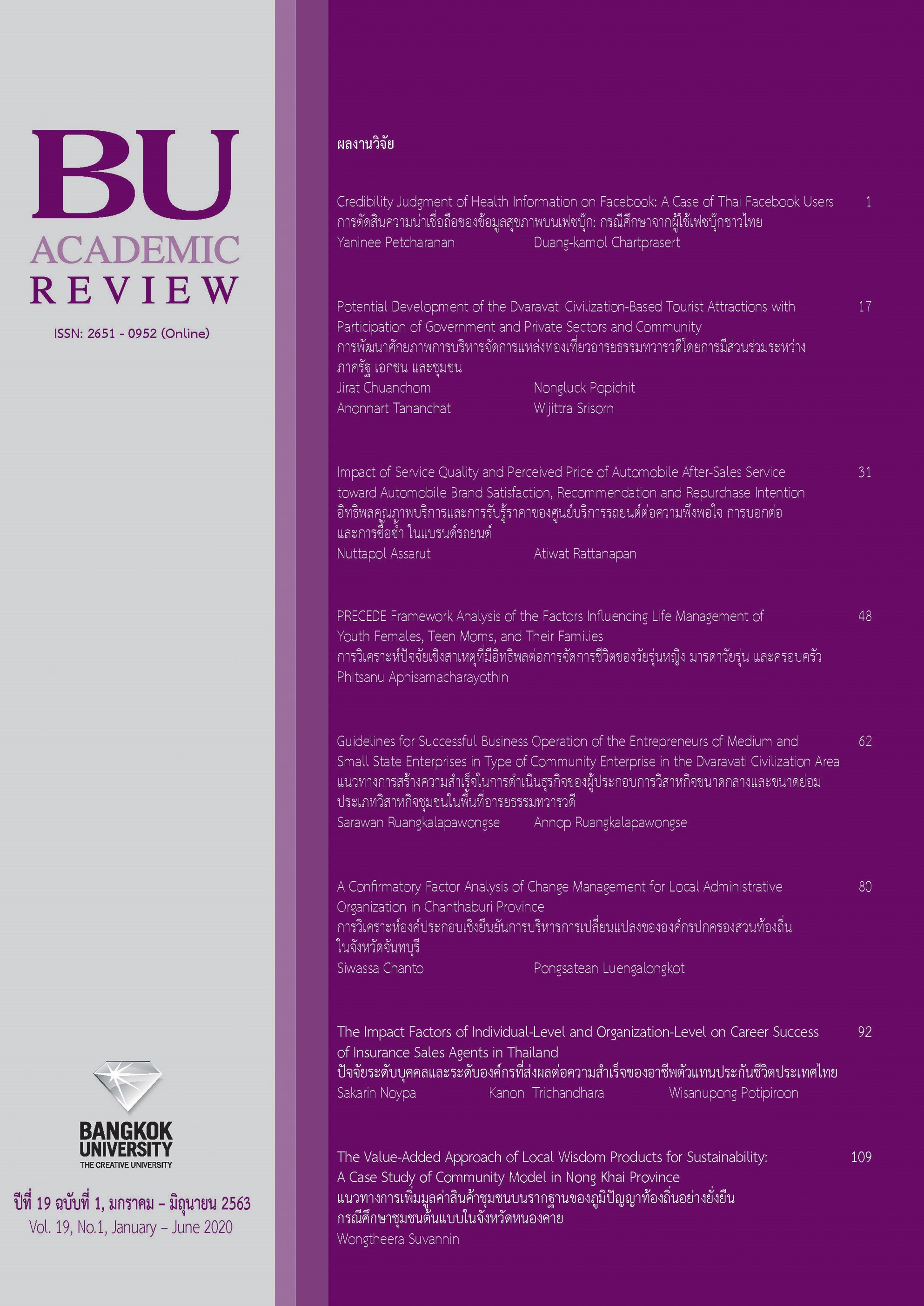PRECEDE Framework Analysis of the Factors Influencing Life Management of Youth Females, Teen Moms, and Their Families
Main Article Content
Abstract
The research aims to study the factors influencing life management of youth females, teen moms, and their families by using PRECEDE Framework. The data were collected by using questionnaires with 500 samples and analyzed by using statistics of mean, S.D., Pearson’s product moment correlation coefficient and multiple regression analysis. The results found that the samples had life management at a high level. As for the predisposing factors, health care knowledge was indicated at a moderate level, while attitude towards life, adaptive ability, and self-values perception were found at high levels. Regarding the enabling factors, welfares accessibility was found at a moderate level while resources accessibility was at a high level. In terms of their reinforcing factors, social support from family and peer was stated at high levels, while that from community and health care profession was at moderate levels, had a positive relation to life management at .01 significant level, with the 48.60 percent of effective prediction.
Article Details
The manuscript submitted for publication must be the original version, submitted only to this particular journal with no prior acceptance for publication elsewhere in other academic journals. The manuscript must also not violate the copyright issue by means of plagiarism.
References
Aphisamacharayothin, P. (2017a). The challenges of Thai district health system management: A pilot study in Nakhon Sawan province, Thailand. RMUTI Journal Science and Technology, 4(2), 61-76.
Aphisamacharayothin, P. (2017b). Sexual and medicine: Reproductive health in sociology. Bangkok: Triple Education Company Limited.
Atsakul, S. (2013). Thai family situation: A case study of single parent families in Bangkok. Journal of
Political Administration and Law, 5(1), 17-45.
Aunghana, P. (2008). Factors relating to sexual behaviors among adolescents in the upper south of
Thailand. (Research report). Nakhon Pathom: Mahidol University.
Berrein, K. F. (1968). General and social systems. New Brunswich: Rutgers University Press.
Boonchan, N. (2014). Mental health problems of single parent or stepmother. Retrieved April 12, 2019, from https://www.dailynews.co.th/article/282548.
Bureau of Reproductive Health. (2014). Childbirth rate in adolescents. Nonthaburi: Ministry of Public
Health.
Bureau of Reproductive Health. (2015). Fact sheet of teenagers: School age and reproductive health.
Nonthaburi: Ministry of Public Health.
Chanlamphu, A. (2015). Female’s birth data. Nonthaburi: Bureau of Reproductive Health.
Cronbach, L. J. (1951). Coefficient alpha and the internal structure of tests. Psychometrika, 16, 297-334.
Daniel, W. (2009). Biostatistics: A foundation for analysis in the health sciences. US: John Wiley and
Sons.
Deckers, L. (2018). Motivation biological, psychological, and environmental. New York: Routledge.
Government Gazette. (2016). Act for Prevention and Solution of the Adolescent Pregnancy Problem,
Bangkok: The Government Gazette.
Glanz, K., & Rimer, B. (2005). Theory at a glance: A guide for health promotion practice. Bethesda:
National Cancer Institute.
Green, L., & Krueter, M. (1999). Health promotion planning: An education approach (3rd ed.). Toronto:
Mayfield Publishing Company.
James, K. (1982). The life management model: The integrated systems approach to professional
mental health worker burnout. US: Ohio State University.
Khamsuwan, K., & Chokthananukun, B. (2012). Single mother family: The marginalization and unfair in
society in marginalized population and the fairness in Thai society. (Research report). Nakhon
Pathom: Institute for Population and Social Research.
Kuder, G. F., & Richardson, M. W. (1937). The theory of the estimation of test reliability. Psychometrika,
(3), 151–160.
Maslow, A. (1954). Motivation and personality. New York: Harper.
Office of the National Economic and Social Development Board. (2012). Eleventh National Economic
and Social Development Plan 2012-2016. Bangkok: Office of the Prime Minister.
Office of the National Economic and Social Development Board. (2013). Transparent mother, teen
pregnancy challenge. Bangkok: Advanced Printing Company Limited.
Phimthavorn, C., Na-Thalang, S., & Chinsri, O. (2014). Characteristics and lifestyles of mothers in a
single stepmother's family: A case study of families in Bangkok. Journal of Social Sciences and
Humanities, 40(1), 85-97.
Phitsanulok Social Development and Human Security Office. (2016). Teenage pregnancy. Phitsanulok: Phitsanulok Social Development and Human Security Office
Reproductive Health Office. (2014). Childbirth rate in adolescents. Nonthaburi: Ministry of Public
Health.
Samgoses, W. (2013). Ability to manage life. Bangkok: Dhurakij Pundit University.
Sharma, S. (2013). Life skills management 1. Retrieved April 20, 2019, from https://www.slideshare.net/qualityswati/life-skills-management-1.
Soison, S. (2010). The psychological experience of single parents in child caring: A qualitative study.
(Research report). Bangkok: Chulalongkorn University.
Srisopha, P., & Kanchanawan, B. (2015). Quality of life of single parents in Bangkok of the single family
network club. Chulalongkorn Medical Journal, 59(2), 181 - 93.
UNICEF. (2008). Fact sheet: Young people and family planning: Teenage pregnancy. Malaysia: UNICEF
Office for Malaysia.
Wattanasupt, N., & Pannarunothai, S. (2015). Project for creating basic welfare kits for caring for
underprivileged and vulnerable children in the education system. (Research report).
Phitsanulok: Naresuan University.


